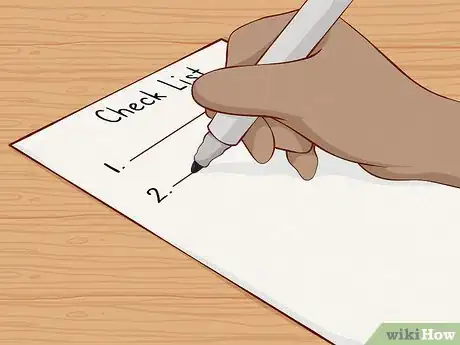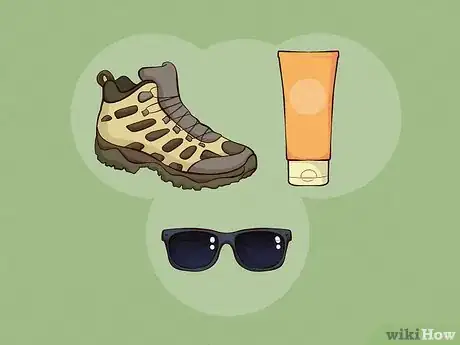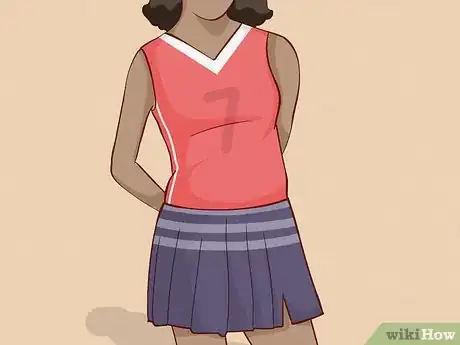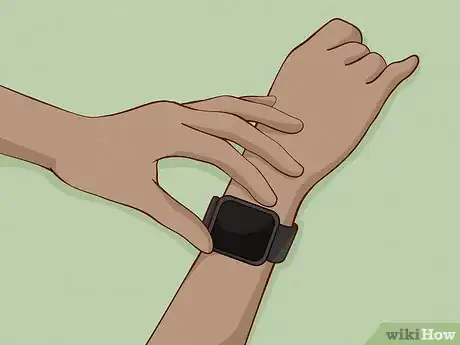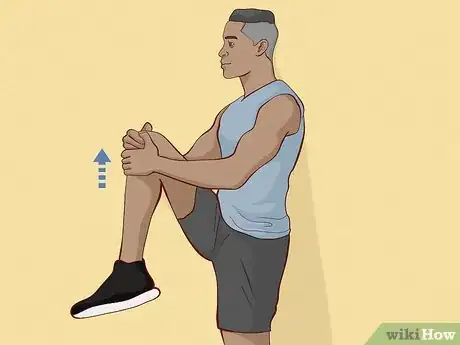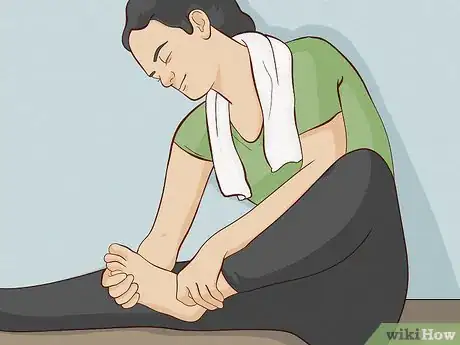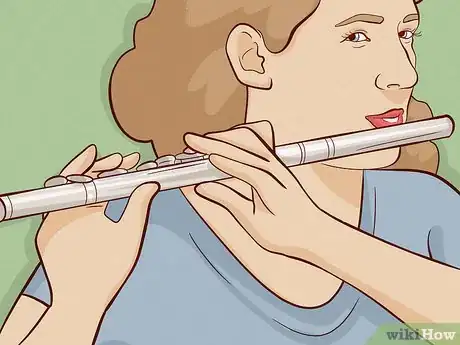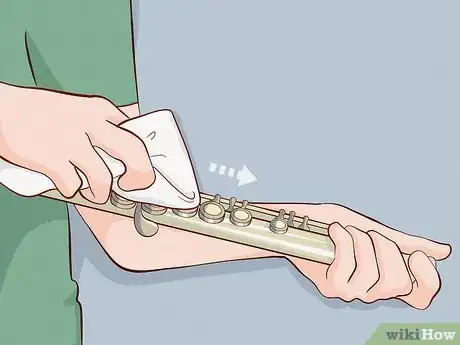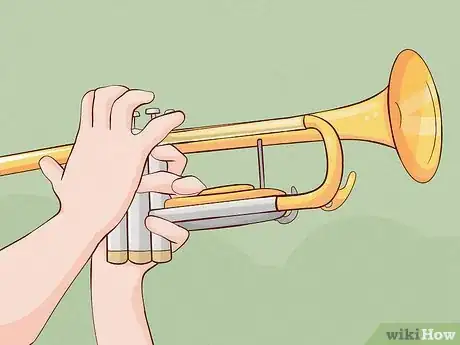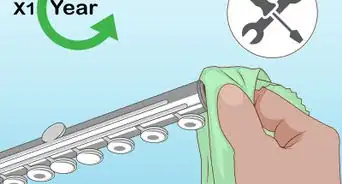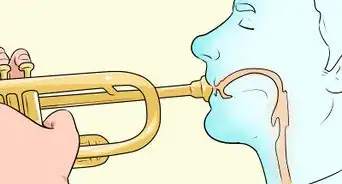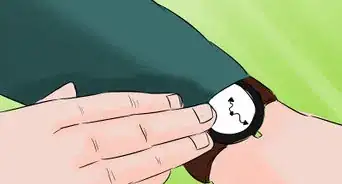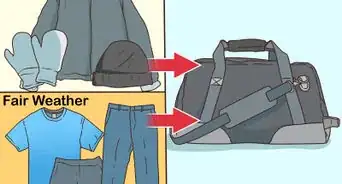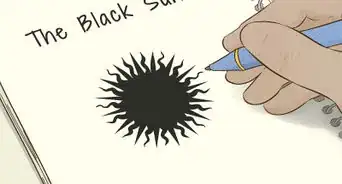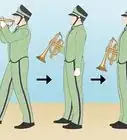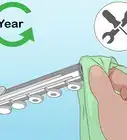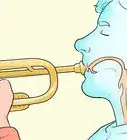wikiHow is a “wiki,” similar to Wikipedia, which means that many of our articles are co-written by multiple authors. To create this article, 87 people, some anonymous, worked to edit and improve it over time.
wikiHow marks an article as reader-approved once it receives enough positive feedback. In this case, several readers have written to tell us that this article was helpful to them, earning it our reader-approved status.
This article has been viewed 218,307 times.
Learn more...
Band camp is a place to have fun while learning to play your instrument. While you are there to work and learn, it doesn't have to be torture. In fact, it can actually be a part of the best days of your life if you know how to get through it!
Steps
Preparing for Band Camp
-
1Remember what to bring for rehearsal. Make a checklist so you don't end up in a predicament.
- Your instrument and your music/lyre and flipbook, if you'll be playing.
- If you have two instruments, it's wise to bring the oldest one. Things tend to get thrown/dropped/wet at band camp and you don't want to ruin your high dollar instrument. However, unless the two instruments are exactly the same use the one you plan to perform with to eliminate any wild cards in your scenario.
- Your instrument and your music/lyre and flipbook, if you'll be playing.
-
2Pack your personal products. Shoes, not flip-flops or sandals, because you will be doing a lot of marching. Your shoes need to be something that can take it, preferably tennis shoes. Regular sneakers will work just fine.[1]
- A water bottle, and a lunch if necessary. If you're a singer going to a similar camp, pack a ton of water and keep hydrated throughout the day. While brass, woodwind, string and percussion players also definitely need to keep hydrated, singing with dry chords could cause injury.
- Sunscreen to prevent burning, as well as guard against melanoma.
- Sunglasses to stop the sun from blocking your eyes, if allowed. A hat can also suffice if you don't have or aren't allowed a pair of sunglasses.
- A change of clothes: just something simple like exercise shorts and a t-shirt. You never know if you might slip in the mud, get sweaty, or simply start feeling uncomfortable.
- Deodorant to put on mid-day (at a meal?) if you have longer rehearsals.
Advertisement -
3Get healthy before band camp. Start with doing some push-ups and sit-ups daily. Also, start eating healthy food and drink at least 1/2 a gallon of water a day as soon as summer starts, to ensure that your body is properly hydrated.[2]
-
4Check the weather beforehand. If you see it's supposed to be 90˚F and sunny, plan accordingly. Many people can overheat during band camp if it's hot outside. If you start to feel fatigued, dizzy, nausea, you may be suffering from heat exhaustion. Tell a section leader, drum major, or staff member immediately. Get to some shade and get some water if you think this is happening to you.
-
5Know your music before band camp starts. Band camp is mainly about combining newly-learned drill sheets with music. If you have it memorized, you will not have to rely on your lyre and can focus on marching and formation. This is especially true for incoming freshmen; more effort will be required to learn techniques of marching - playing music you didn't memorize and marching something you learned a few days ago will not mix well. Not only will this strategy be less stressful, but it will save the band less time working individually.
Maintaining a Healthy Lifestyle
-
1Take care of yourself. You'll perform better and feel better if you take care of your body. While marching band is technically considered an art, it is more rigorous than many sports.[3]
- Stretch. Marching band can be demanding during the summer. You don’t want to pull a muscle or injure yourself. Also, take it easy when you have off time- Even though it's summer, staying outside and running around is sure to wear you out, leaving you with little energy or focus when it's time to get back to work.
- Wear sunscreen and a hat if you will be marching in the sun. That sunburn won't feel good tomorrow, and it'll spare you sock tans, glove tans, and drum harness tans (somewhat). Remember to reapply every 2 hours or so. Wear chapstick that protects against the sun. Sunburned lips are not fun to play an instrument with, especially for brass players. Also be sure to wear shoes that don't come off in the mud if you know your school's fields are muddy during the summer.
- Drink plenty of water. This means water or Gatorade/Powerade (see Warnings). Soda and juice will dehydrate you and can damage woodwind instruments if you drink them shortly before playing. Be sure to drink a full glass of water 20-30 min before you go out into the heat. Avoid drinking milk or eating dairy products just before camp. The heat will not cause it to curdle, your stomach will stay at a constant temperature unless you get heat stroke and the acid in your stomach always curdles milk anyway. Dairy will take a while to fully digest and you could become nauseous. Get an insulated jug for water. Don't forget to clean and dry it after each day's practice, so it doesn't gunk up inside.
- Eat healthy foods! Eating food that wouldn't benefit your body in the first place will be even worse after such a strenuous activity such as marching. People seem to discredit how tiring it is- Heavy clothing and walking around in the sun all day is hard enough, but doing that with any instrument- from a lightweight piccolo to a fifty-pound bass drum- will surely exhaust you. Eat what you would before a workout, and plan to drink throughout the day.
- Wear movable clothing and comfortable, athletic shoes. Dress appropriately for the weather and don't forget a jacket and gloves if it will get cold.
-
2Learn how to wear your uniform and try it on. Take extra care if you're a freshman; make sure you get fitted for one. This way you can avoid disasters before an actual show at a competition. Minutes before your first show is not the time to learn the intricacies of tying your citation cord, discover that your pants are too short or too long, or learn that nobody ever issued you a plume.
Conducting Yourself at Band Camp
-
1Dress comfortably and appropriately. Since band camp takes place over the summer, you'll want to wear shorts and a light-colored t-shirt or tank top, unless otherwise specified by your band director. Also be aware of the dress codes followed by the band and the school, and if there is any difference between the two. For instance, if the school normally has a rule that you can't wear shorts that aren't at least a certain length, the band may choose to be lenient on this during the summer.
-
2Be on time. Timely arrivals show you want to make a commitment to the program and will save your section from having to run laps, or being otherwise reprimanded by your director/drum major. Remember: In band, early is on time, on time is late, and late means running laps. Also, being on time or early gets rehearsal to start (and end) on time. You don't want to be the person that makes rehearsal end later.[4]
-
3Warm up before rehearsal. Chances are you haven't played or done a long rehearsal for a while. You may also wish to stretch.
-
4Learn rehearsal and performance etiquette. Ask your section leader or band director if you're not sure about something. Good etiquette helps things flow smoothly and look professional.
-
5Try your hardest. You will probably make faster friends and be respected more if you make a decent effort at marching and playing your instrument. "When in doubt, play out." If you're trying to hide that you can't play part of the music or execute a certain move, nobody will be able to help you and when someone finally notices that you've been doing it wrong, you'll have a harder time learning.[5]
-
6Be optimistic. Complaining or bellyaching is extremely annoying and unhelpful. Every second that you spend complaining is another second that could have been spent making progress. Don't complain. It accomplishes nothing and people will likely see you as annoying.
-
7Make friends. Get to know your classmates, your section, whoever is sitting or standing next to you in formation, and anybody else that seems interesting or friendly. You have band and music in common already. However, do not talk when you're setting up formations, at attention, or listening to the director talk. You have just joined a family joining this band. It may not seem like it now, but you'll learn to love them![6]
- Be open-minded. You might march with people who are homosexual, bisexual, or of different ethnicities/ races/ religions. You'll have to set aside any prejudices because music doesn't discriminate. Besides, you'll become a better person if you let go of your hatred for certain groups.
- Talk to people outside of your section. You're with other musicians, and band kids tend to be accepting. Besides, you might find a really good group of friends.
-
8Learn the show. Now is the time to practice. Practice as you would like to perform... learn your formations, work, music, rhythms, etc.
-
9Care for your instrument. Insert the brass mouthpiece or woodwind part firmly enough that it doesn't fly out when snapped up and down. Tape them during the show.Remove tape as soon as possible to avoid getting the mouthpiece sticky or ruining it.
- Avoid getting a woodwind wet, especially the pads - they will fall off. If you are forced to march in the rain close all holes/keys. Use your cleaning cloth to dry the instrument after each practice. If you ever have to get pads replaced on your marching instrument, ask for plastic pads.
- Oil your valves or slide before practice. It's much harder from mid-field.
- For percussion, take the opportunity to learn from your drum instructor how to tie cymbals properly and how to replace and tune a drumhead. If you don't already know those instruments as well as you know the instruments you spend the most time at, be it at a lesson or in the school auditorium, you need to take the initiative to ask someone how they work in full detail. Trust the words of every percussionist ever- not only will it keep the instruments in good condition for this session of camp, but it will also further your musical education and may come in handy in other performances, auditions and ensembles.
- Learn the proper way to set your instrument down: not on its keys or delicate valves. If you must set your instrument on the ground, set it with the others from your section in a formation. It's a nice flourish and shows off sectional spirit, and it might help save them from a careless foot. However, remember that your protective case or a stand made for the instrument is the most secure place to keep it.
- Consider marching a second-string instrument, particularly during rehearsals. You can buy one on Ebay or even at a garage sale.
-
10Be respectful and courteous towards band directors and assistants. Often they are busy or stressed, so be understanding.
- Never handle or play somebody else's instrument without permission. It is very rude, and you will be held accountable if the instrument breaks.
- If you are given a drill sheet with your formations on it or music do not lose it, because you will probably get in trouble. Your whole section might have to run laps!
-
11Keep going. This goes hand in hand with working hard, but put in effort. The more effort you put in at band camp, the easier it will be at competitions. You don't want to spend all your time later in the season playing catch-up. (This is especially for brass players. Holding up the horn requires a lot of endurance!)
- Remember that everyone is at band camp to learn. If you're a newcomer, don't take it personally when an instructor gives advice. Remember, they're trying to help you look better in performance. If you're a returning member, help out newcomers and be patient with them. You learned once, too.
-
12Be aware of your place on the totem pole. If you're an underclassman, don't try to boss others around as if you're the section leader. On the flip side, if you're an upperclassman, don't alienate and harass those younger than you. If you treat the new people poorly, they won't return the next season. Everyone should keep in mind that while they may not like the band captains or drum major(s), they are the highest in student leadership. The same goes for section leaders: you don't have to like them, but you should listen to them, after all they are there to help you and they were chosen for a reason!
-
13Be considerate of chaperones. Many bands have parents as chaperones. They are there on their own time, often using vacation time. Chaperones assist the band director. They are not there to pick up after you.
-
14Don't bad-mouth or try to correct the other sections. For example, saying things like "Wow, the flags were really off today," or "The trumpets are way too loud," is a BAD idea, especially if you're an underclassmen. It's not your place to judge the other sections, and it's a great way to make enemies, which is something you don't want to do. If there is a correction to be made, the BD will make it. As a camp community, remember, you have to work as a team. If something goes wrong in one section and you talk badly of it, not only does it reflect badly on you, but will also reflect badly on the community as a whole. If you work together as a team with a positive mindset, you're sure to thrive together- and you'll learn something great along the way!
-
15Get some rest. Band camp can be strenuous, and it's easier if you're well rested.
Community Q&A
-
QuestionI am nervous that the other campers will be much more advanced. Any advice?
 Community AnswerKeep in mind that other campers probably have the same worries. The important thing isn't to be the best at camp, but to improve during the course of the camp. If there are campers who are more advanced than you, think of it as an opportunity to learn from them and improve your own playing.
Community AnswerKeep in mind that other campers probably have the same worries. The important thing isn't to be the best at camp, but to improve during the course of the camp. If there are campers who are more advanced than you, think of it as an opportunity to learn from them and improve your own playing. -
QuestionHow do I not faint or pass out? Last band camp I fainted six times.
 さいちょうCommunity AnswerMake sure you stay hydrated during the entire camp and wear very loose and light colored clothing. You might need to drink something that gives energy, but not heavy with sugar. Eat nutritious foods, enough to get you through the day.
さいちょうCommunity AnswerMake sure you stay hydrated during the entire camp and wear very loose and light colored clothing. You might need to drink something that gives energy, but not heavy with sugar. Eat nutritious foods, enough to get you through the day. -
QuestionI'm going into high school marching band in less than 4 months. I'm very nervous that physically I won't be able to handle band camp due to my bad lungs. Any advice?
 Community AnswerJust speak to the bandleader or camp official about your condition. Do as much as you can, but take breaks when you need to.
Community AnswerJust speak to the bandleader or camp official about your condition. Do as much as you can, but take breaks when you need to.
Warnings
- After rain, woodwinds' pads will likely be damaged. Rain does happen during marching band and it is a magical thing, but remember to use filter paper to get all the moisture out of the pads after being in the rain. Otherwise you will have to pay hundreds of dollars just to replace the pads.⧼thumbs_response⧽
- If you are in the Drumline and you feel that your drum is becoming too heavy (especially quads) or that you are feeling pain or numbness in an area you shouldn't, you should immediately ask to take your drum(s) off. Remember: taking the drum off is always better than falling over, fainting, or causing permanent back injury. This also applies to sousaphones and contrabass bugles.⧼thumbs_response⧽
- Have your 'emergency kit' handy. Brass, that means valve oil, woodwinds, extra reeds, and so on. Be prepared for anything.⧼thumbs_response⧽
- Woodwinds and brass should not play their instrument after eating or drinking sugary stuff (like Gatorade or powerade). It's fine to have a snack during breaks, just make sure to wash it down with water.⧼thumbs_response⧽
- If you are a freshman, don't come off too cocky or you will be on the bottom of the totem pole until you graduate. No one forgets how people were freshman year of band, and being arrogant is only going to make you look bad.⧼thumbs_response⧽
- Don't start drama. If you're forced to join marching band by your parents or whoever, then having a negative attitude or turning people against each other won't solve anything. You might get kicked out, but your reputation will be in tatters, and you'll have punished people that never did a thing to you.⧼thumbs_response⧽
- Respect is key. Don't sass the upperclassmen, section leaders, drum major(s), your band director, or anyone else. That's a quick way to get into trouble, and garner an undesirable reputation. You're not being funny when you mouth off to other people in band; you're being rude.⧼thumbs_response⧽
- Don't talk when the band director, staff, drum majors, or section leaders are talking. Not only will this make them mad, but it will distract people around you from what they're saying, which could be very important. If you need help finding your drill spot, quietly raise your hand and someone will gladly help you. Respect upperclassmen- chances are they're right and you're wrong.⧼thumbs_response⧽
- Be disciplined. Marching Band is very military-esque. When the director is speaking, you do not. When you need to snap to attention, you snap. Take it seriously, many skills that you learn in this activity can be applied to everyday life!⧼thumbs_response⧽
- Make sure you are doing what you are supposed to be doing. Starting band camp as a new member with a lazy reputation will leave you in a negative place with the band director.⧼thumbs_response⧽
- Don't be "that guy". There's always that one person who forgets to wear their band shirt, or loses one of their marching shoes and shows up without it because they started looking the night before.⧼thumbs_response⧽
Things You'll Need
- Your instrument
- A backpack
- Water
- Sunscreen and chapstick
- Insect repellent (clove oil diluted in water makes for a pleasant-smelling alternative)
- Music and/or drill sheets in a binder with plastic slip-covers to protect them.
- Ear plugs (mostly used for indoor drum line practices)
- Lunch (most band camps go through lunch and directors give time to eat)
- Proper emergency instrument supplies (Slide/Valve Oil, Cork grease, Reeds)
- Good shoes (tennis shoes or good walking shoes)
References
- ↑ http://sparkmanband.com/faqs/how-should-i-prepare-for-band-camp/
- ↑ http://sparkmanband.com/faqs/how-should-i-prepare-for-band-camp/
- ↑ https://blog.bandshoppe.com/2019/06/12/5-steps-to-prepare-for-band-camp/
- ↑ https://www.wgi.org/how-to-survive-band-camp/
- ↑ https://www.meyermusic.com/music-camp-101-tips-surviving-enjoying-music-camp/
- ↑ https://www.wgi.org/how-to-survive-band-camp/
About This Article
Band camp can be physically demanding, but if you prepare well, it can also be super fun. Before you go to band camp, try to memorize your drill sheets so you only have to focus on marching. In the morning before practice, pack your bag with the essentials, like a water bottle, snacks, deodorant, sunscreen, and sunglasses. Make sure you wear comfortable athletic clothing and tennis shoes since you’ll be doing a lot of moving. You’ll also want to stretch before each practice so you don’t get sore. While band camp is a lot of work, you should try to have fun, too. During breaks, take time to talk to people outside your section since having friends at band camp will make it a lot more fun! To learn how to stay motivated during hard practices, read on!
